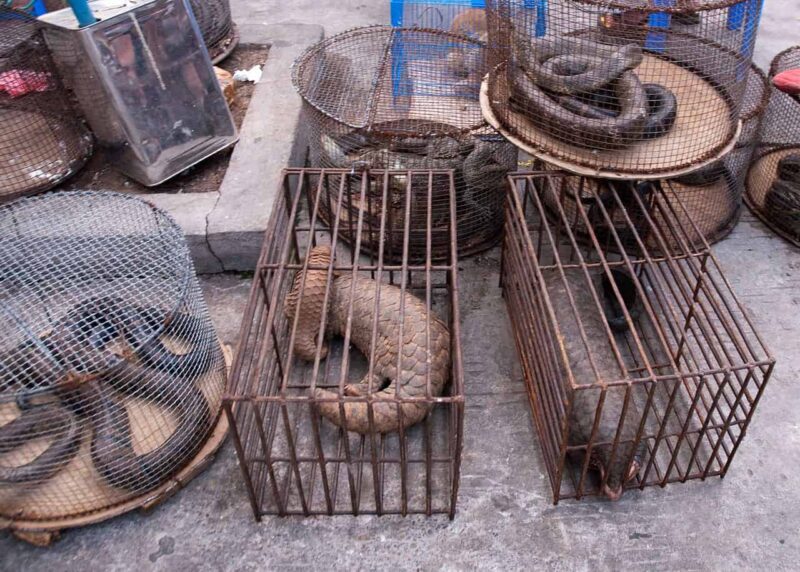The last few months have shown just how quickly and dramatically our world can change. We’ve all had to shift our work in response to the Covid-19 outbreak, which has not only placed restrictions on our movement, but forced us to alter many of our habits in order to stay healthy, both physically and mentally, and to seek new ways of providing our communities with vital information in the midst of a public health crisis.
At Internews’ Earth Journalism Network, that has meant taking our workshops, trainings and mentorship online. We’ve also been working to build new resources and toolkits and have reached out to many of our current partners and story grantees to determine what they need at this time.
Earlier this month we kicked off a series of webinars on how to cover the pandemic and related environmental issues, including zoonotic diseases and wildlife trafficking. One of our first webinars explored the threats posed by human-wildlife interactions and how environmental disruption is heightening our risk of zoonotic pandemics like this new coronavirus.
Guest speaker Maarten Hoek, a doctor in veterinary medicine, epidemiologist, risk analyst, and public health medical consultant provided valuable in-depth background on zoonotic diseases and how they have become such a threat. He also explained what’s being done to address the problem, offered key terminology that journalists and all of us should understand, and highlighted the role the media can play in preventing and reporting on the spread of diseases.
“You may have all the knowledge on zoonotic diseases … but the way you bring the message is super important,” Hoek said. Sensationalist reporting and fake or misleading news is hugely detrimental to human health because it causes fear, creates confusion and can be counterproductive, he added.
More than 350 journalists registered for that first webinar, and an additional 400+ have watched the recording, indicating a clear appetite for more. EJN subsequently created a tipsheet that can be found on our website with the answers to many of the questions journalists asked.
In addition to exploring the links between disease outbreaks and the environment, we’re also hosting conversations with seasoned reporters and public health experts about responsible practices journalists can follow when covering both a pandemic and an “infodemic,” as we did with our second webinar: Staying Safe While Reporting on COVID-19.
We just hosted our second zoonotic disease webinar on Earth Day, April 22, with a focus on how scientists are working in the field – in Africa and Asia, particularly – to detect and prevent the emergence of viruses with pandemic potential. (Watch a recording of that webinar here).
And we have several more coming up that will discuss more specifically how to cover wildlife trafficking: one, to be held on April 23rd, will focus on reporting in East Africa; and next week, on April 28th, our Asia-Pacific team will host a webinar featuring investigative reporters from China and Vietnam, who will share insights and tips on gathering and analyzing data drawn from court documents and local media reports to track wildlife trafficking trends.
EJN is also expanding our scope by partnering with the Initiative on Communication and Sustainability at Columbia University’s Earth Institute, as we did to host “The Press and the Pandemic,” a virtual workshop that brought in Pulitzer prize-winning reporter Laurie Garrett for a two-hour interactive conservation with journalists and journalism students about the challenges and choices facing reporters covering epidemics in general and the coronavirus pandemic in particular.
Finally, EJN’s parent organization Internews has assembled a team dedicated to meeting the needs of a wider journalism community beyond the environment and conservation. You can see its collection of resources, including links to past webinars, here.
This is just the beginning. We’re re-organizing our website to make these resources easier to access and are continuing to organize future webinars based on interests and needs our network has shared with us.
For current story grantees, we’re providing outreach and support, arranging calls to discuss what research they can do in the absence of field reporting and other ways they can research and move their stories forward. This pandemic will influence our world long past the time when current restrictions relax. It’s heartening to know that many places have deemed reporters “essential workers,” in recognition of the critical value we provide to our communities.
As the COVID-19 outbreak unfolds, the environment is no less important a story. If anything, the pandemic shows just how vulnerable our civilization is to disruption, with the threat of climate change now looming over everything. EJN will continue to support coverage of our natural world and all the ways humans are interacting with it during this pandemic and beyond.
(Banner photo: Illicit wildlife trade in Myanmar. Credit Dan Bennett/Flickr/CC)
